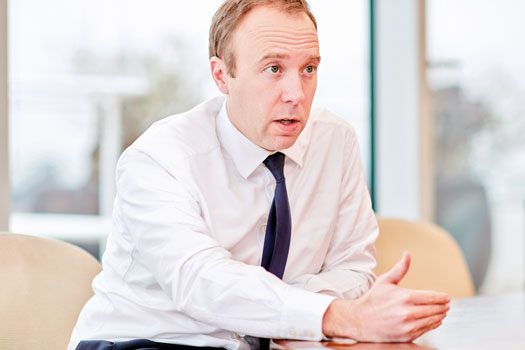Matt Hancock has announced his advocacy for free movement for overseas doctors if he is made the next Prime Minister.
Mr Hancock pledged to lift immigration restrictions for all qualified doctors and nurses from all around the world if he became the next Prime Minister, in a speech made this morning at an East London hospital.
He said the only limitations to foreign doctors coming to work in the UK should be whether they hold the right qualifications, if they have a job offer from the NHS, and speak English capably.
Mr Hancock said: ‘Our NHS could not provide its world-class service to patients without the hardworking doctors and nurses from other nations. That’s why I believe, after Brexit, we need to see the free movement of medics – doctors and nurses – from all around the world.
‘Wherever you’re from, if you’re qualified, speak English and have a job offer, I want you to have an unrestricted right to work for our NHS and live in our country. We have the best health service in the world – and if I become prime minister, I will make sure it has access to the very best talent in the world.’
The recently published interim People’s Plan also stated an increased effort to recruit overseas doctors.
Mr Hancock added that the NHS has always had an international workforce and the people plan addresses the NHS’s intention to attract more doctors from overseas.
He said: ‘The National Health Service has always had an international workforce, from the Windrush Generation to the Warsaw Generation. We must never forget the enormous contribution that people born beyond these shores have made to one of this nation’s greatest institutions.
‘The People Plan spells out how we need a new Windrush Generation for the NHS. A recruitment drive to attract the brightest and best doctors, nurses, and clinical staff from overseas. And I want to send a very clear message to those people: if you have the talent, the skills, and the determination to pack up your hopes and dreams in a suitcase and travel to the other side of the world, then the NHS will be your new home.’
The People’s Plan said: ‘We will increase our efforts to recruit overseas doctors, who play an invaluable role in helping address current service pressures.’
This comes after the Migratory Advisory Committee (MAC), an independent Governmental body, recently recommended the Government include GPs on the shortage occupation list (SOL) due to ‘sufficient and overwhelming evidence of a UK-wide shortage’.
The committee concluded by saying most roles in the healthcare sector should be put on the list and for medical practitioners, to ‘include entire occupation’ and that more effective planning was needed to meet growing demands within the NHS.
This means that applications to work in general practice would be prioritised for tier 2 work visas if the cap of 20,700 high-skilled workers is reached.
It said: ‘Migration has made an important contribution to the sector’s workforce and no doubt will continue to do so. However, the rise in vacancies and concern over lack of staff has occurred under freedom of movement and during a period when many health occupations have been on the SOL.’
The committee added: ‘We recognise that many of those who responded to the call for evidence admit that migration is not the sole nor the long-term solution to shortages but that in the short-term their inclusion on the SOL can alleviate some difficulties.’
The BMA has said the proposal is a ‘victory’, after repeated calling for GPs to be added.
BMA council chair Dr Chaand Nagpaul said the Government should now ‘swiftly’ act on the MAC’s recommendations.
‘The BMA is delighted that such a respected body as the Migrations Advisory Committee has listened to the BMA and proposed a bold, but much needed, recommendation to place all doctors on the shortage occupation list. This welcome proposal is a victory for the BMA and for the sustained lobbying by the Association to address the chronic workforce shortages which are undermining the delivery of patient care across the NHS.
‘The Government must now move swiftly to implement the MAC’s proposals, but it also needs to ensure that this is only the first step in bringing together a coherent, well-funded workforce plan that in the long term addresses the damaging pressures on our NHS.’
New NHS Digital figures published last week show the number on fully-qualified GPs has fallen by 441 in the last year, a 1.5% decrease.
Pulse October survey
Take our July 2025 survey to potentially win £1.000 worth of tokens












